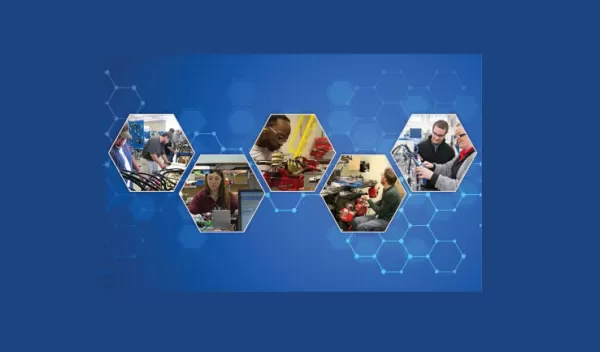
NSF invests in future manufacturing projects that reimagine processes and protect the environment
The U.S. National Science Foundation announced an investment that will help secure U.S. leadership and competitiveness in transformational manufacturing far into the future. These awards will allow scientists and engineers to advance research in the emerging areas of biomanufacturing, cyber manufacturing and eco manufacturing.
NSF has awarded $31.5 million for 22 new research and seed projects through its Future Manufacturing program. NSF grants will support research and education at 40 unique universities and two companies in 18 states, including five jurisdictions eligible for the Established Program to Stimulate Competitive Research (EPSCoR). The new awards build on last year's $40 million investment.
"NSF's Future Manufacturing investment aims to enable new manufacturing capabilities that do not exist today while increasing sustainability, security and innovation for future manufacturing processes. With fundamental, convergent research and a diverse future workforce, we can overcome scientific, technological, educational, economic and social barriers and equitably grow manufacturing capacity and jobs across the nation," said NSF Director Sethuraman Panchanathan. "This is about making the leap to the next generation of manufacturing capabilities where the U.S. can lead the world."
In the coming decade, it will be critical to address labor gaps in manufacturing, including biomanufacturing, cyber manufacturing and eco manufacturing. A highly skilled manufacturing workforce is imperative to national security and supply chain reliability. Researchers and industry partners funded through the program will investigate a wide range of biological materials for use in manufacturing; investigate areas to transform the predictability, security, reliability and efficiency of cyber manufacturing; and develop approaches to redesign entire eco-manufacturing life cycles for sustainability.
Research grants were awarded to the institutions listed below.
- A Systems-Enabled Paradigm Shift for Modular Sustainable Chemical Manufacturing, led by the University of Delaware
- Process-Structure-Property Relationships of 3D Printed Earth Materials and Structures, led by Columbia University with the University of Colorado-Boulder
- Privacy Preserving Tiny Machine Learning Edge Analytics to Enable AI Commons for Secure Manufacturing, led by Purdue University with Harvard University
- Future Eco Manufacturing of Recyclable Soft Electronics, led by North Carolina State University with University of North Carolina and Yale University
- Sustainable Route to 3D Solid-State Sodium-ion Battery by Direct Ink Writing and Capillary Rise Infiltration, led by University of Pennsylvania with University of Massachusetts-Amherst, Drexel University, Brown University, Stanford University and Xerion Advanced Battery Corporation
- Dry Manufacturing of Solid-State Sodium Batteries for Energy Storage at Large Scale, led by University of California-San Diego with Massachusetts Institute of Technology
- DNA & RNA Condensate Droplets for Programmable Separation and Manufacture of Biomolecules, led by the University of California-Los Angeles, with Pasadena City College, University of California-Santa Barbara, and the California Institute of Technology
- A Cyber Nanomanufacturing Platform for Large-scale Production of High-quality MXenes and Other Two-dimensional Nanomaterials, led by Drexel University with the University of Pennsylvania, and Indiana University-Purdue University at Indianapolis
- Cyber-Coordinated Analytical Framework for Multi-stage Distributed Future Manufacturing Systems, led by the State University of New York at Buffalo, with Arizona State University
Seed grants were awarded to the institutions listed below.
- Biophysical Modulation for Scalable Biomanufacturing of Stem Cell-Derived Therapeutics, led by the University of Arkansas with the University of Oregon and Penderia Technologies
- Manufacturing of Hybrid Tissue-Electronic and Photonic Devices, led by the State University of New York Polytechnic Institute
- Rapid Biomanufacturing of mRNA Vaccines in Plant Chloroplasts, led by the University of California-Riverside with Carnegie Mellon University and the University of California-San Diego
- Microbial Foundry for Distributed Manufacturing of mRNA-Containing Biomaterials, led by Purdue University with the University of Delaware
- End-to-End Continuous Manufacture of Cell Therapies Enabled by Robotics and Microfluidic Processing, led by the Georgia Institute of Technology with the University of Iowa
- Resilient and Reliable Cyber-Physical-Human-Machine Teams: Toward Future of Cybermanufacturing, led by University of Connecticut
- Cybermanufacturing of Wide-Bandgap Semiconductor Devices Enabled by Simulation Augmented Machine Learning, led by Virginia Polytechnic Institute with San Jose State University
- Establishing a Cyber-Physical Framework and Pilot System of Wavelength Selective Photopolymerization based Rapid Continuous Multi-Material Manufacturing, led by University of Pittsburgh with Carnegie Mellon University
- Does Nature Invoke the Optimum? A Bioinspired Hierarchical Manufacturing Process, led by the University of California, Berkeley, with Harvard University
- Federated Deep Learning for Future Ubiquitous Distributed Additive Manufacturing, led by Auburn University, with George Mason University
- Multimaterial Manufacturing of Eco-Friendly and Biodegradable Paper-Based Flexible Hybrid Electronics, led by Auburn University
- Integration and Recycling of High-Quality Ceramics and Composites Enabled by Scalable Cold Sintering Manufacturing, led by Penn State
- Teambuilding, Training, Manufacturing Efficiency and Recycling for Sustainable Polymer Composites, led by the University of Southern California, with California State University-Long Beach
Each year manufacturers, in association with the National Association of Manufacturers, the Manufacturing Institute and federal agency partners, across the U.S. host Manufacturing Day events throughout the month of October. The event showcases modern manufacturing careers and encourages companies and institutions to engage with students, parents, educators and community leaders to promote highly skilled and technical roles in manufacturing.
More information about the Future Manufacturing program, a list of Fiscal Year 2021 awards and a list of all Future Manufacturing awards can be found at nsf.gov.
